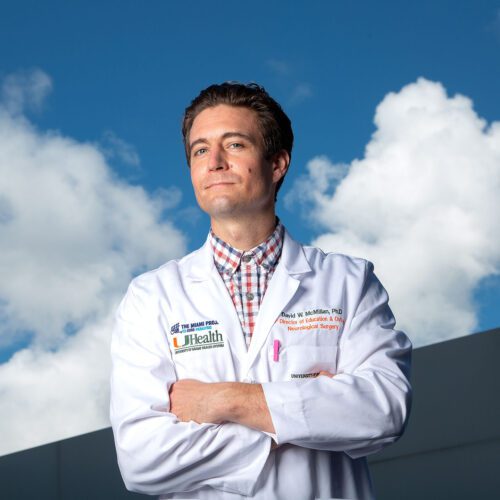David W. McMillan, Ph.D.
Director of Education and Outreach, The Miami Project
Research Assistant Professor, Department of Neurological Surgery

Christine E. Lynn Rehabilitation Center for The Miami Project to Cure Paralysis
1611 NW 12th Avenue, Room 2.141 (R-48)
Miami, FL 33136
Biography
Research Interests
Areas Of Research
Publications
More
I am a dual-role academic, serving The Miami Project as Director of Education and Outreach and the University of Miami Leonard M. Miller School of Medicine as Research Assistant Professor for Department of Neurological Surgery. I conduct research with and for people who have paralysis, primarily due to spinal cord injury (SCI).
In my outreach role, I facilitate The Miami Project’s illustrative faculty to achieve success in their clinical trials through recruitment, operational coordination, and communicaiton. I liaise between our institution and community partners and stakeholders. And I direct educational initiatives such as our Henry G. Steinbrenner Scholars Program.
In my professorship, my dissertation pertained to the role of the autonomic nervous system in the absorption, trafficking, and fates of dietary fat.
However, I am now refocusing my efforts to align with regional demands and and affordances, aiming at the disproportionate risks and rewards posed by the Tropical Atlantic on people living with SCI. Regarding risks, I study the vulnerabilities of people with SCI to climate hazards in the form of flooding, heat, and hurricanes. Regarding rewards, I collaborate with community partners such as Shake-A-Leg Miami and the Sabrina Cohen Foundation to study the transformative potential that adapted ocean activities—such as sailing, scuba diving, swimming, and others—carries for adults with physical disability.
Understanding and treatment of secondary complications of SCI; community research partnership
Scientific Activities: Advances in the medical management of the acute and chronic complications of spinal cord injury (SCI) have expanded life expectancy of those with this condition. As people with SCI live longer fuller lives, the secondary complications of a lifetime of paralysis are allowed to surface. These secondary complications, referred to as co-morbidities and often not visible from the outside, involve almost every organ system in the body and have a profound impact on the routines, daily activities, and health of persons with SCI. My research involves human subjects and focuses primarily on the metabolic health complications of SCI. Specifically, I am interested in understanding disorders of fat metabolism that occur after SCI, and then in optimizing accessible (“low-tech/low-cost”) treatments for the outcomes of disordered fat metabolism—such as obesity. Regarding an understanding of fat metabolism: In an on-going project (NCT03691532) employing stable isotope lipid tracers—a first in persons with SCI—we are establishing an understanding of the impact of SCI on absorption and utilization of dietary fats. This understanding of the acute handling of exogenous (dietary) fat will be one piece in the puzzle of understanding the well-documented chronic accumulation of fat that leads to obesity. Preliminary analysis from this project suggests that level of SCI influences absorption of dietary fats, with higher injuries possibly leading to slower transit times (PMID: 33613318). Regarding treatments for fat metabolism: My dissertation began by showing that “high intensity” circuit resistance exercise, while relying heavily on sugars to meet the energy demands during exercise, results in long lasting increases in fat utilization after exercise in persons with paraplegia and incomplete tetraplegia (PMID: 33655367). A follow up study in persons with paraplegia expanded on this topic by showing that exercise intensity modulates the postexericse metabolic “boost” independent of the energy cost of the exercise session (PMID: 33433151). I am now involved in on-going trials at our center examining the long-term effects of exercise interventions on obesity and other measures of metabolic health (NCT03495986).
Research Partnerships: Along with my distinct scientific agenda, I serve an academic role that affords me the potential to facilitate community research partnerships. As Director of Education and Outreach for The Miami Project to Cure Paralysis I manage a suite of programs and events to disseminate our research activities to a diverse range of audiences. Along with this medical science liaison role, I am deeply interested in using this position to cultivate participatory research relationships. In my personal research I have successfully engaged community research partners, and am now working on scaling laterally the techniques I learned from this process. In doing so I aim for researchers and the communities they serve to benefit from the participatory process of co-creation and shared ownership.
Visit Dr. McMillan’s Publication Listing
News Stories
Meet the Researcher: Dr. David McMillan (08/2021)
For any inquiries about the clinical research programs at The Miami Project, please contact the Education Department at 305-243-7108 or mpinfo@med.miami.edu.
Professional Affiliations/Memberships
American Spinal Injury Association (ASIA)
